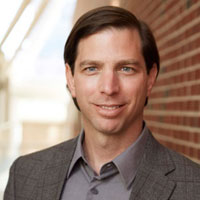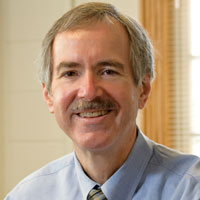From research to real world
December 1, 2014
Implementation science
[im-pluh-muhn-tey-shuhn] [sahy-uhns]
noun
1. the dissemination and implementation of research into real-world settings.
.
Bryan Weiner, PhD, professor of health policy and management, specializes in implementation science, the dissemination and implementation of research into real-world settings.
Implementation researchers collect a growing body of evidence about what works, when and for whom. “There’s a gap, however, between what we know and what we do,” Weiner says. “The intention of implementation science is to close that knowing-doing gap by systematically identifying and addressing the barriers.”
Weiner tackles practical projects. For instance, he has stepped in to help investigators who study demand-price models. Researchers develop and test interventions, but rarely do they consider how much the intervention costs users. Yet, cost is often critically important to potential consumers in deciding whether to use a product or service. By studying demand-based pricing, for instance, investigators determine what health departments can afford and relay that feedback to researchers — who then can develop and test interventions that meet a particular price point.
 Weiner also consults on a Dynamic Simulation Modeling project that enables users to interact with models that predict the efficacy of an evidence-based intervention. Typically, success levels are calculated based upon the average of the trial participant pool. However, people who might use the intervention want to know what kind of success they’ll have with their particular patient population. With Dynamic Simulation Modeling, users can adjust the parameters to tailor an accurate prediction.
Weiner also consults on a Dynamic Simulation Modeling project that enables users to interact with models that predict the efficacy of an evidence-based intervention. Typically, success levels are calculated based upon the average of the trial participant pool. However, people who might use the intervention want to know what kind of success they’ll have with their particular patient population. With Dynamic Simulation Modeling, users can adjust the parameters to tailor an accurate prediction.
Thanks in part to the gift from Dennis Gillings and Joan Gillings, the Gillings School funded a consortium for implementation science with RTI International, led by Weiner and Leila Kahwati, MD, from RTI.
“Implementation science requires partnerships with community and provider organizations because we’re attempting to solve real-world problems,” Weiner says. “We have highly effective evidence-based interventions, but they are only of value if someone uses them.”
A number of faculty members throughout the Gillings School use implementation science in their research. Among them are Brian Pence, PhD, assistant professor of epidemiology; Susan Ennett, PhD, and Vangie Foshee, PhD, professors of health behavior; Rohit Ramaswamy, PhD, clinical associate professor in the Public Health Leadership Program and maternal and child health; and Ilene Speizer, PhD, research professor of maternal and child health, along with other MEASURE Evaluation colleagues. (See cpc.unc.edu/measure.)
Nowhere is implementation science more important than in the field of maternal and child health. Herbert Peterson, MD, Kenan Distinguished Professor and former chair of the maternal and child health department, says that 99 percent of maternal and newborn deaths occur in developing countries.
“We know why mothers and babies are dying, and we know what we need to do to prevent those deaths,” Peterson says. “But the interventions require functioning health systems — trained surgeons and midwives, sufficient supplies of safe blood, adequately equipped surgical facilities. Those are things we don’t have in the places where most deaths occur.”
Overcoming those barriers requires that multiple disciplines work together. Schools of medicine, public health and engineering can develop technological innovations feasible to implement in low-resource settings. People who understand healthy systems and processes can develop innovative ways to fit the technology into complicated structures.
Peterson notes that business sciences are an essential part of the mix, so that interventions can be implemented to scale and in a fiscally sustainable way.
UNC has begun to offer new concentrations for degree programs in implementation science. The Gillings Global Implementation Laboratory, a course first taught in spring 2014, engages a small team of students to design and implement solutions to complex public health problems in real-world N.C. and global settings. Developed and taught by Ramaswamy, along with Suzanne Hobbs, DrPH, clinical professor of health policy and management and of nutrition, and Anita Farel, DrPH, clinical professor of maternal and child health, the lab fielded student teams in Wake County, N.C., and in a program led by FHI 360 to prevent sexually transmitted infections (STIs) in India. The Wake County group implemented changes that significantly reduced patients’ waiting time in STI clinics and drew high praise from clinic administrators.
.
Undergirding the success of such programs will be the capability to carry out interdisciplinary research — something at which Gillings School researchers have excelled for decades.
 .
.
When Dale Williams founded UNC’s Center for Health Promotion and Disease Prevention in 1985, he reported to all five health sciences deans (medicine, dentistry, nursing, pharmacy and public health) — an indication of the interdisciplinary nature that set the Gillings School apart from its contemporaries. Nearly 30 years later, that collaborative attitude remains strong, Peterson says.
“Implementation science works when it develops its own methodologies, approaches and tools, when it becomes interdisciplinary, then trans-disciplinary,” Peterson says. “UNC is well-positioned to be a global leader not only because we excel in those different disciplines but also because of our collaborative spirit.”
—Nancy Oates
Carolina Public Health is a publication of the University of North Carolina at Chapel Hill Gillings School of Global Public Health. To view previous issues, please visit sph.unc.edu/cph.


